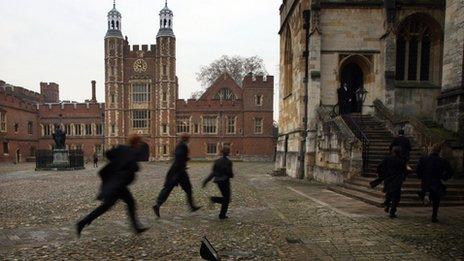Single-sex schools 'preserve innocence', says Eton head
- Published

Eton is renowned for educating leaders
Single-sex schools allow children to retain their "innocence" for longer, the outgoing head of Eton has said.
Tony Little said "pretty graphic" sex education was now necessary at age nine because of growing social pressures.
But teaching girls and boys separately meant they could "be themselves" until a later stage.
He is to be chief education officer of the Gems Education network of schools in Europe, the US and Africa, after 13 years as the boys' school head.
Speaking at the Global Education and Skills Forum, organised by the Varkey Foundation, the charitable arm of Gems, in Dubai, Mr Little said he was not a particular advocate for single-sex or co-educational schools, adding that there were other, more important things than this.
"What does strike me is that in a single-sex environment, particularly at the age of 13, 14, 15, there is an opportunity for both boys and girls to be themselves for longer. To be 'boyish' for longer, to be young girls," he said.
"One of the real challenges we face as parents and particularly in schools, and this has accelerated in the last few years, is the growing apparent sophistication of children at a younger age. The need even at the age of nine now, for pretty graphic sex education because of the pressures that are being put on girls particularly, from the age 11 and upwards."
He added that the "sad thing" is that detailed sex education is now needed.
"I guess what I'm saying is in a single-sex environment, you can allow innocence to last a little longer," Mr Little said.
'Creating tensions'
The headmaster also said that single-sex schools "remove some of the pressures" adding "there are ways of talking about emotional development and about sexuality with single-gender groups, that oddly, and perhaps perversely, can get you further than in co-ed groups."
Mr Little went on to say that he does have a "strong sense" that schools should either be single-sex or co-educational all the way through, adding there is a "strange habit" in the UK of having hybrid schools that teach boys, for example, up to a certain point and then have girls join in the sixth-form.
"I don't think, for a variety of reasons, that really works," he said.
"You're creating tensions that don't need to be there."
While for some students it is fine, "the casualty rate is pretty high", Mr Little said as "people find it very difficult to adjust to the new situation".